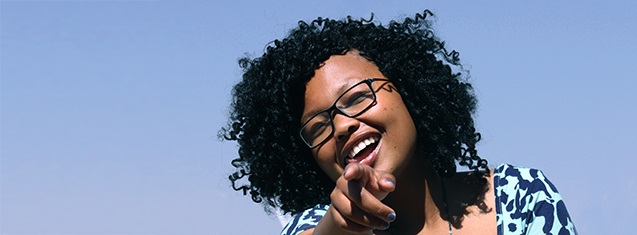
At the UFS, we are committed to our Human Project, which sets the standard for good behaviour and care. It reaches internally to our students and externally to our prospective students and our communities.
And so, the Kovsies #FaceOfFacebook was born from the need to communicate with students and thus become a virtual friend. Yearly auditions are held to choose the new face representing the UFS on Facebook. The successful candidate holds the title #FaceOfFacebook for the next 12 months, attending events and filming short video clips to post on our Facebook page.
We had a quick chat with our current #FaceOfFacebook, Katleho 'Blue' Letube …
Who is Blue?
"Media mistress, fashion phenom, diva divine darling, superwoman and lover of life.
I was born in a small town called Bothaville, where my mom and her side of the family are living . I started pre-school there, moved and completed my schooling career at St. Andrew's High School (a very proud S aint) in Welkom. That is where my dad and his side of the family are living . Also, I am a proud resident of House NJ vd Merwe and I am studying Governance and Political Transformation."
How do you balance everything you do?
"It's relatively easy for me to strike a balance between my academics, social life and leadership duties, because Jesus is at the centre of all that I do. He is my guide and my strength. However, I also take it upon myself to prioritise. Although I am a '' liker of things'' , I ensure that my academics are the priority and everything else falls into place perfectly."
Are you dating someone?
"Hahaha, wouldn't you just love to know? Well, yes I am off-market. I'm completely taken and I'm happy."
What drives you?
"I always feel the urge to expand myself by working harder, smarter, stronger, and more efficiently. If there's an extra mile to go, the strength inside me draws out the willingness and ability to go that extra mile."
What is it like being the #FaceOfFacebook?
"I have been privileged to be entrusted with this duty and I carry it out with pride and passion. Being the #FaceOfFacebook means you get to meet a new face on campus almost every day, because people recognis e you and want to know you better. This opportunity has opened many doors for me and has equipped me with skills that have allowed me to grow as an individual. Therefore I will forever be grateful."
Where are you going to be in five years from now?
"Five years from now I would like to see myself as a better person both personally and professionally, in a respectable and reputed position earned through my hard work and skills. However, do not be surprised if you see me as a presenter on Vuzu.TV."
Advice to prospective students?
"Do not be that pupil who enrolled at this awesome institute and never takes advantage of its kindness. The University of The Free State is an institution that offers an excessive amount of opportunities to students. Step up and get out of your comfort zone. See an opportunity, seek the opportunity and cease it. You are at a university that provides you with a platform for you to grow."
What's your favourite colour?
My favourite colours are Black, White and Blue – hahaha!!
Kovsies can keep in touch:
Facebook: Katlego Blue Letube
Twitter: @Princess_blue31
Instagram: katlegoletube